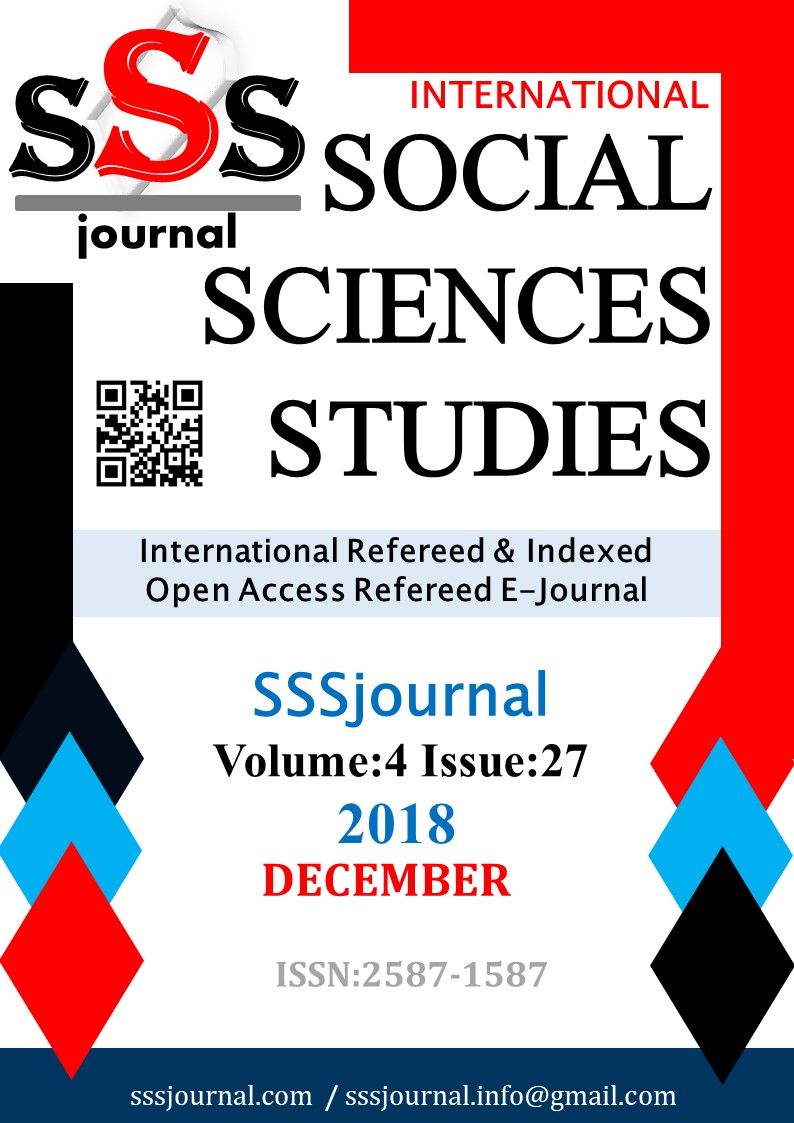Author :
Abstract
Bu çalışmanın amacı, turistik deneyimin psikolojik etkisinin ortaya çıkarılmasıdır. Turistik deneyimin psikolojik etkileri, deneyimin duygusal, bilişsel, deneyimsel ve dönüşümsel etkisiyle açıklanmaya çalışılmıştır. Araştırma kapsamında, 2013-2017 tarihlerinde farklı ülkelerden gelerek Tematik Akvaryum ziyareti gerçekleştiren ve deneyimlerini TripAdvisor.com’da paylaşan ziyaretçilerin yorumları içerik analizi ve frekans analizi ile irdelenmiştir. Bu çalışmada deneyimlerin psikolojik yönü duygusal, bilişsel, deneyimsel ve dönüşümsel olarak adlandırılmıştır. Yapılan analizler sonucunda, tematik akvaryum deneyiminin duygusal etkisinin, bilişsel, deneyimsel ve dönüşümsel etkisinden daha fazla hissedildiği sonucuna ulaşılmıştır. Duygusal etkiyi ise sırasıyla deneyimsel, bilişsel ve son olarak dönüşümsel etkinin takip ettiği görülmüştür.
Keywords
Abstract
The purpose of this study is to reveal the psychological impact of touristic experience. The psychological impact of touristic experience has been tried to be explained by the emotional, cognitive, experiential, and transformational impacts of experience. Within the scope of the research, the shared comments of the visitors from different countries about the Thematic Aquarium located in İstanbul, Turkey on TripAdvisor between 2013 and 2017 were analyzed by content analysis and frequency analysis. In this study, the psychological aspects of experiences are called emotional, cognitive, experiential, and transformational. It was found as a result of the analyses that the emotional impact of thematic aquarium experience was felt more than the cognitive, experiential, and transformational impacts. Emotional impact was respectively followed by experiential, cognitive, and finally transformational impacts.
Keywords
- Aho, S. K. (2001). Towards a general theory of touristic experiences: Modelling experience process in
- Aho, S. K. (2001). Towards a general theory of touristic experiences: Modelling experience process in tourism. Tourism Review, 56(3/4), 33-37. doi.org/10.1108/eb058368
- Aydın, B. (2016). Sosyal medyada restoran imajı: Tripadvisor örneği. Disiplinlerarası Akademik Turizm Dergisi, 1(1), 13-30.
- Cangöz, B. (2005). Geçmişten günümüze belleği açıklamaya yönelik yaklaşımlara kısa bir bakış. Hacettepe Üniversitesi Edebiyat Fakültesi Dergisi, 22(1), 51-62.
- Camprubí, R., & Coromina, L. (2016). Content analysis in tourism research. Tourism Management Perspectives, 18, 134-140
- Carr, N. (2011). Children's and Families' Holiday Experience. Routledge: London & New York.
- Choi, S., Lehto, X.Y., & Morrison, A. M. (2007). Destination image representation on the web: Contentanalysis of Macau travel related websites. Tourism Management 28, 118–129. doi.org/10.1016/j.tourman.2006.03.002
- Dalgıç, A., Güler, O., & Birdir, K. (2016). Tripadvisor.com’da yer alan restoran şikâyetlerinin analizi:Mersin ve Hatay’da yöresel yiyecek sunan restoranlara yönelik bir araştırma. Journal of Tourism and Gastronomy Studies,4(1), 153-173. doi.org/10.21325/jotags.2016.28
- Deutsch, M., & Gerard, H. B. (1955). A study of normative and informational social influences uponindividual judgment. The journal of Abnormal and Social Psychology, 51, 629-636. doi.org/10.1037/h0046408
- Fennell, D. A. (2001): A Content Analysis of Ecotourism Definitions. Current Issues in Tourism, 4(5), 403-421.doi.org/10.1080/13683500108667896
- Güney, S. (2015). Sosyal Psikoloji. 3. Basım, Nobel, Ankara.
- Güzel, Ö. F. (2013). Marka itibarını korumada şikâyet takibi: Çevrimiçi seyahat 2.0 bilgi kanallarında bir uygulama. İnternet Uygulamaları ve Yönetimi, 5(1), 5-19.
- Güzel, Ö. F. (2014). Deneyimsel kritik değer sürücülerinin elektronik ağızdan ağıza iletişimle seyahat 2.0bilgi kanallarına yansıması: Tripadvisor.com üzerinde bir içerik analizi. Uluslararası Yönetim İktisat ve İşletme Dergisi, 10(22), 193-210.
- Kara, C., Bulut, B., Topkaya, Y., & Taşkıran, C. (2014). Değerler eğitimine sosyal psikolojik bir yaklaşım: Normatif sosyal etki ve bilgisel sosyal etkinin işlevsellliği. Turkish Studies, 9(5), 1205-1218.
- Latene, B. (1981). The psychology of social impact. American Psychologist, 36(4), 343-356. doi.org/10.1037/0003-066X.36.4.343
- Miguéns, J., Baggio, R., & Costa, C. (2008). Social media and tourism destinations: TripAdvisor case study. Advances in Tourism Research 2008, Aveiro, Portugal, May. 26-28.
- Nickerson, N. P. (1995). Tourism and gambling content analysis. Annals of Tourism Research, 22(1), 53- 66.
- Öymen-Özak N., & Pulat-Gökmen, G. (2009). Bellek ve mekân ilişkisi üzerine bir model önerisi. İTÜ Dergisi/A Mimarlık, Planlama, Tasarım, 8(2), 145-155.
- Quan, S., & Wang, N. (2004). Towards a structural model of the tourist experience:an illustration fromfood experiences in tourism. Tourism Management 25, 297–305. doi:10.1016/S0261-5177(03)00130-4
- Scott, N., & Smith, A. E. (2005) Use of automated Content Analysis techniques for event image. Assessment, Tourism Recreation Research, 30(2), 87-91, doi.org/10.1080/02508281.2005.11081477
- Stepchenkova, S., Kirilenko, A. P., & Morrison, A. M. (2009). Facilitating Content Analysis in tourism research. Journal of Travel Research, 47(4), 454-469.
- TripAdvisor (2018a). TripAdvisor brand style guide. file:///C:/Users/user/Desktop/TheNewTripAdvisor_StyleGuide.pdf
- TripAdvisor (2018b). About TripAdvisor. https://tripadvisor.mediaroom.com/us-about-usTulving, E. (1972). Episodic and semantic memory’. Organization of Memory, 1, 381-403
- Yıldırım, A., & Şimşek, H. (2008). Sosyal Bilimlerde Nitel Araştırma Yöntemleri. 6. Baskı, Seçkin Yayıncılık, Ankara.





